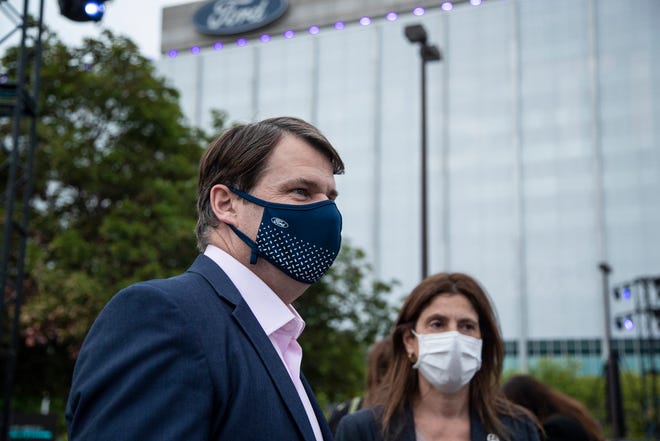Ford Motor Co. CEO Jim Farley pointed to UAW hourly worker absenteeism this week as playing a notable role in the automaker’s current production problems, a claim the union questioned.
Farley, in an interview with CNN Business on Wednesday, also cited the chip shortage and overall supply chain challenges that have continued to worsen during the pandemic. He said factory worker absentee rates exceed 20% in some plants.
“Face masks are required again in major U.S. auto factories and, according to Ford CEO Jim Farley, that has some workers deciding not to show up for work. In some factories, absentee rates can exceed 20%, he said in an interview with CNN Business,” the network reported on Wednesday.
“When a fifth of your workforce isn’t coming in, in a manufacturing operation where everyone has their job and you don’t know who’s going to be missing every day, man, it’s really challenging,” Farley said, according to CNN.
Brian Rothenberg, spokesman for the union that represents some 56,000 hourly Ford workers, pushed back on Friday at the idea that factory worker absenteeism is somehow to blame for Ford’s manufacturing challenges.

General Motors, Ford and Stellantis — the Detroit Three automakers that collaborate with its UAW union leaders on pandemic safety protocols — all require masks in the factories.
“That mandate has contributed to the absentee problem,” CNN quoted Farley saying this week.
The UAW reiterated its commitment to the job.
“While we are unsure of the context in how the company addressed the attendance issue, we question the accuracy of the data being shared,” Rothenberg told the Free Press in response to questions about Ford UAW workers.
“It is a common practice through the years for UAW members to utilize the majority of their vacation during the summer months and in return our locals make arrangements to allow the use of temporary employees in order to assure production is not adversely affected,” Rothenberg said. “UAW Ford members take attendance seriously and work hard, including throughout the challenges of the current pandemic.”
Kelli Felker, Ford global manufacturing and labor communications manager, explained on Friday, “Jim was responding to a question about the challenges of operating through the pandemic. He pointed out that absenteeism is higher for a variety of reasons, which puts a stress on our manufacturing system. We are fortunate to be able to work with the UAW to find solutions to keep our factories running during this time and deeply appreciate all of the men and women who are working hard every day to build quality vehicles for our customers.”
When explicitly asked to confirm the accuracy of the 20% rate of absenteeism, as Farley said, Felker replied, “We don’t release that information.”
Ironically, Rothenberg said, UAW workers stepped up during these uncertain times — not back.
“In fact, at a highly dangerous time of the pandemic UAW members stepped up to make critical PPE equipment when all plants were in health and safety induced shutdown. We are proud that UAW Ford members continue to step up in such a critical time.”
Automakers generally have a team of temporary workers fill in when regular workers are gone. Ford is the largest employer of hourly autoworkers in the U.S., with approximately 56,000 total at the start of 2020.
Policies related to vacation time and time off are addressed by collective bargaining.
Workers outside the automotive industry have said they have been attracted to the UAW partly because of its commitment to safety protocols.
More:GM requiring salaried workforce to disclose vaccination status
More:Ford stock was cheaper than a sandwich. Now shareholders are gloating.
More:Lawsuit: Newly unsealed emails suggest Ford targeted high-performing older workers
This story was edited for clarity after it was published.
Contact Phoebe Wall Howard:313-618-1034orphoward@freepress.com.Follow her on Twitter@phoebesaid. Read more on Ford and sign up for our autos newsletter.